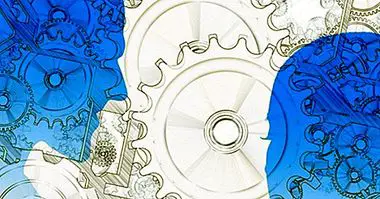Differences between emotions and feelings
The difference between emotion and feeling is something that often produces confusion when it comes to understanding how the human mind works.
The concepts of emotion and feeling can easily be confused and, in fact, even within the world of psychology, they are often used as if they were synonyms.
However, some authors defend the idea that there are differences between emotions and feelings and that, therefore, are words used to label different mental phenomena.
Distinguishing emotion and feeling
When we talk about this subject it is important to keep in mind that there are different theories about emotion , which provide different explanations about how our emotional and emotional aspects work and, from the perspective of neurosciences, about how the part of the brain responsible for producing emotions works: the limbic system.
However, within the authors and researchers that separate the concepts of feelings and emotions (such as Antonio Damasio), There is some consensus when it comes to indicating how they differ .
First, let's see how these two words are defined.
What is an emotion?
An emotion is a set of neurochemical and hormonal responses that predispose us to react in certain ways to an external stimulus (such as the vision of a spider) or internal (as a memory about the childhood years).
That means that an emotion is what is generated by the limbic system of the brain when the groups of neurons related to certain experiences, so that we are predisposed to act in a certain way.
This happens because, throughout our lives, our brain is not limited to "memorizing data", but also learns certain ways in which we must react to those experiences. Somehow, the information of what we experience goes hand in hand with the information about how we react before that; they are not two kinds of separate information.
That is why, if we learn to associate insects with bites, when we see one we will tend to experience the sensation of fear: our body will have learned that, with that visual information, that is the appropriate reaction.
- Related article: The 8 types of emotions (classification and description)
What is a feeling?
A feeling is similar to an emotion and is closely related to the limbic system, but In addition to this spontaneous, uncontrollable and automatic predisposition, it includes the conscious evaluation What we do from this experience. That is to say, that in a feeling there is a conscious assessment of emotion and subjective experience in general.
For example, if we see a spider, we will be able to self-examine what we feel and what we think in such a situation and reflect on what other experiences this situation reminds us of, what are the different ways in which we can react to that stimulus , how rational is the disgust or the fear we feel, etc.
What is the difference between the two?
As we have seen, both emotions and feelings have to do with something irrational that has to do with the subjective way we experience a situation. Neither phenomenon can be translated in the form of words faithfully and without leaving many nuances in the inkwell, and it is the other person who, making an effort of empathy, must build in his mind and from his own experiences how we should feel.
However, the fundamental difference between emotion and feelings is that the first one is totally basic, primitive and unidirectional (in the sense that it is something that appears automatically when a stimulus occurs) while the feeling includes the ability to think and reflect in a conscious way on what it feels and, therefore, has to do with the ability to think in terms abstract and symbolic.
Works of art, for example, are the classic characterization of feelings, because they are abstract sublimations of emotions. In a poem there are not only emotions, but necessarily there must also be feeling, something that allows to express in a symbolic way what it feels like.
So that, the feelings are bidirectional , since there is something that goes from the most basic and primitive mental processes to consciousness, but there is also something that goes from consciousness to the way in which this situation is valued and experienced in a holistic and global way.
Both are inseparable
And here comes an apparent paradox: although the concepts of feeling and emotion refer to different things, to practice there where there is an emotion there is always a feeling (or several).Both are presented at the same time, and the words we use for conceptually separated only exist in theory to allow us to understand in a more precise way about what part of the conscious experience we are describing.
In the same way that where there are genes there is an environment that influences the way in which these are expressed, emotion and feelings can not be presented separately (in the conscious and healthy human being) and therefore overlap. The distinction between the two is more virtual and theoretical than material.
That is why the difference between feeling and emotion is only used because it is useful in certain cases and because each of them could explain different neurological processes that work in parallel, not because we can effectively isolate a feeling and separate it from the emotion with which it is presented . In psychology and neurosciences, for better or for worse, things are not so simple.



















